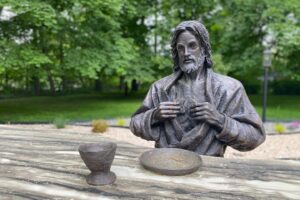Prayer is at the same time both an easy thing to explain as well as a difficult thing to explain. In some sense, it is so difficult because it is so very easy.
What we have in the Bible there is a whole book devoted just to recording prayers, known as the psalms. There are even many references to particular people in the Old as well as New Testaments praying, from prophets of old, to patriarch and matriarchs, apostles and even God himself praying.
What we do not have in the Bible is a straightforward definition of what prayer is.
But this is where things always get tricky. In Christian circles we have a hard time shifting from theology to spirituality. These are two topics or fields that relate to one another, but theology is more or less straightforward while spirituality is a little more nuanced. (In part because for a number of centuries now theology has been approached as a science, and we live in a post-Enlightenment world that loves the sciences, logic, rationality.)
But perhaps prayer is best described in or by poetry.
Here is “Prayer (I)” by George Herbert, a Christian English poet. This poem is nothing more than a list of poetic definitions of prayer…
Prayer the church’s banquet, angel’s age,
God’s breath in man returning to his birth,
The soul in paraphrase, heart in pilgrimage,
The Christian plummet sounding heav’n and earth
Engine against th’ Almighty, sinner’s tow’r,
Reversed thunder, Christ-side-piercing spear,
The six-days world transposing in an hour,
A kind of tune, which all things hear and fear;
Softness, and peace, and joy, and love, and bliss,
Exalted manna, gladness of the best,
Heaven in ordinary, man well drest,
The milky way, the bird of Paradise,
Church-bells beyond the stars heard, the soul’s blood,
The land of spices; something understood.
Isn’t that good?
My personal favorites are: God’s breath in man return to his birth, reversed thunder, Christ-side-piercing spear, a kind of tune, which all things hear and fear, the soul’s blood.
The reality is that prayer is too personal to be described scientifically. Granted, we might be able to articulate the psycho-somatic benefits of prayer scientifically, but prayer is mysterious because WE are mysterious. WE are a mix of light and shadow, mortal and spiritual, finite but aware of infinite… so why should we ever expect prayer to be anything else but mysterious?
Take a look again at the poem above, and take note for yourself which poetic description of prayer resonates with you. Then, I dare you to pray in light of that favorite definition.
Grace and peace to you.


